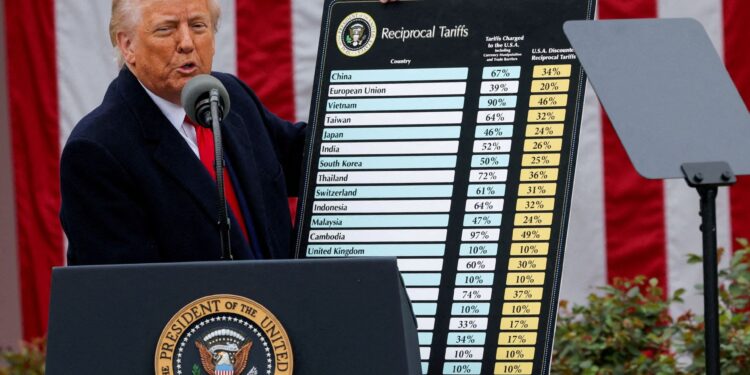As of today, US President Donald Trump imposed a new batch of customs duties on dozens of trade partners of the United States, including exorbitant fees that exceeded 100% on China, which has vowed to respond “firmly.”
With these additional fees – for example 20% of the European Union – the Asian and European stock exchanges returned.
As for Beijing, the White House published a “average” presidential decree raising the fees that Washington will impose on imports from China from 34% to 84%, adding to 20%, mainly imposed on it, raising the total tariff to 104% from 4.00 GMT today.
China responded immediately, and the Ministry of Commerce announced that it has “firm will and adequate means, and will be taken firmly counter -measures and fights to the end if the United States insists on continuing to escalate economic measures and commercial restrictions.”
Foreign Ministry spokesman Lynn Jian also confirmed during a routine press conference that “the legitimate right of the Chinese people to development is not subject to behavior, sovereignty of China and its security and its development interests cannot be prejudiced.”
Meanwhile, Beijing considered that it is possible to resolve differences with the United States “through equal dialogue and mutual cooperation,” according to what was reported in a “white book” reported by the New China News Agency (Xinhua) today.
Beijing has imposed 34% counter -fees on American products, and will come into effect tomorrow.
https://www.youtube.com/watch?v=82jv7MOMDE0
Market
Despite a slight recovery on Tuesday evening, panic control over the world throughout the world’s trade war that Trump has started.
In the Asian markets:
- The South Korea index, Cos, decreased 2.3%.
- The Tokyo Stock Exchange closed a decline of 3.93%
- The Taipei Stock Exchange closed a decline of 5.8%.
- The Shanghai Stock Exchange increased 1.31% upon closing.
And in Europe:
The stock exchanges opened a sharp decline in the first trading:
- 2.85 %in Paris (France).
- And 2.37% in Frankfurt (Germany).
- And 2.31% in London (UK).
- And 2.78% in Milan (Italy).
- The Swiss stock exchange fell 2.86%.
A first batch of generalized customs duties by 10%entered into force last Saturday, on all American imports, with rare exceptions such as gold and energy.
With the exception of the vast tariff applied to China, the new fees imposed on about 60 commercial parties for the states ranged between 11% and 50%.
The European Union, the first commercial partner of the United States, is subject to 20% of the fees, and Vietnam 46%.
Today, the members of the Association of Southeast Asian Countries (ASEAN) – which the United States considers the main market for its exports – called for a “boldly move” in response to the risks of the trade war.
Facing the panic that dominated the world, Trump sought to reassure, and he promised to conclude “a size -based agreements” with commercial partners while giving priority to Asian allies and at the forefront of which are Japan and South Korea.
https://www.youtube.com/watch?v=r4mrzrqpc
“Solving negotiation”
The conservative billionaire (the president) boasted, during a dinner with officials from his Republican party, that dozens of countries, including – according to Beijing, “call us” and seek to reach a settlement.
European Commission President Ursula von der Line urged to “avoid escalation” during a phone call with Chinese Prime Minister Lee Qiang, calling for a “solution through negotiation.”
A European Union spokesman said that the bloc will announce its response, “early next week”, but the list of the French Press Agency showed that the Bourbon (a type of alcohol) is excluded from the fees by 25%, which Brussels intends to impose on some American products.
For his part, French President Emmanuel Macron said, “The goal is to reach a situation where President Trump returns from his decision.”
For her part, right -wing Italian Prime Minister Georgeta Meloni – which is close to Trump – announced yesterday evening that she will visit Washington on April 17.
Trump’s trade war is threatening to undermine the global economy, and analysts have warned that it may cause high prices, increase unemployment and decline in growth.
The United Nations Secretary -General Antonio Guterres also expressed his great concern about the most vulnerable developing countries, stressing that “the consequences will be sweeping.”



